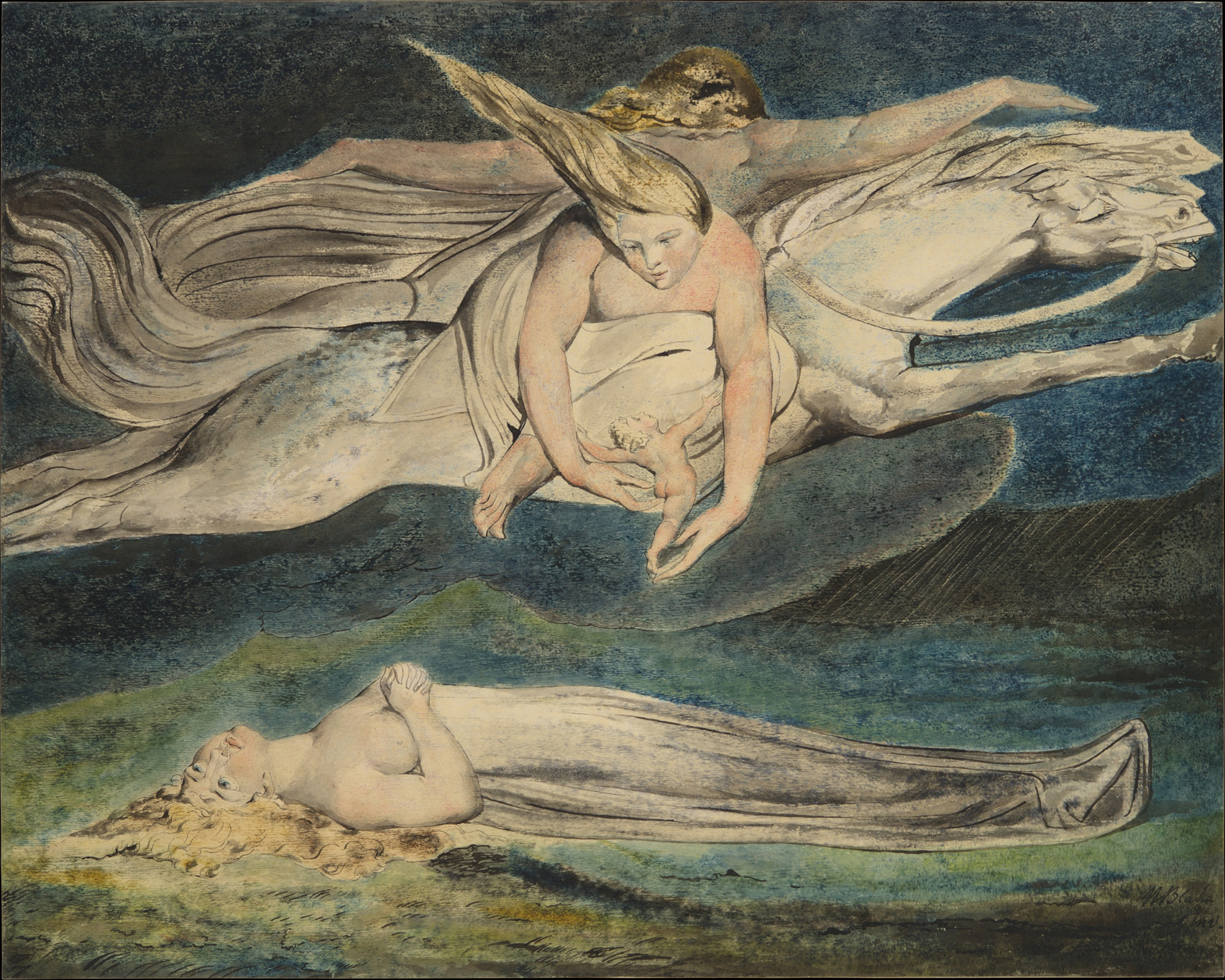
Pity, by William Blake, c. 1795. The Metropolitan Museum of Art, Gift of Mrs. Robert W. Goelet, transferred from European Paintings, 1958.
In her essay “The Devil’s Bait,” Leslie Jamison reckons with her response to the stories of patients who suffer a painful, unexplained skin disease. Even if we cannot relieve them, she wonders, is it our responsibility to listen to them? “It wasn’t until the seventeenth century,” Jamison writes, “that the words pity and piety were fully distinguished. Sympathy was understood as a kind of duty, an obligation to some basic human bond.” Yet the relationship between these words has all but dropped away. All the same, the similarity between these words seemed to me too clever, too close not to yield an archaeology of meaning, if I pulled at the right thread.
The Oxford English Dictionary confirms that pity and piety not only once shared a meaning, but also have a common root, the Latin pietas, meaning “devotion.” We know pity today as the inconvenient twinge felt at the sight of another’s suffering. For Aristotle, writing in the fourth century bc, pity (eleos) is a “kind of pain.” As he argues in Rhetoric, pity is caused by seeing misfortune “befall one who does not deserve it, and which we might expect to befall ourselves or some friend of ours, and moreover to befall us soon.” The feeling is intimately connected with fear: it can be evoked to move an audience, either in speech or art. Fear, here, connotes remembering the past, as in, remember that misfortune can injure us at any moment in the future.
Aristotle uses the term eleos for pity, but the Greeks had another word, oiktos, that connoted the kind of pain we experience as scorn. When viewing the humiliation of those in distress, oiktos represents inhibition from actively confronting or reflecting on suffering, and thus, an inability to be moved. Pity as eleos, however, occurs more frequently throughout classical literature. Where oiktos reflects a shrinking away from suffering, eleos signals a move toward relief, an ethical response toward reflecting on the pain of others. How, if it all, does this resemble piety?
Pity holds strong as the favored translation of the Greek eleos and the Latin misericordia (“heart-suffering”) in the Iliad, Odyssey, and Aeneid. (I was surprised to learn that the last work gives us the words misericord, a wooden crutch to support churchgoers who stand during hours of prayer, as well as misericorde, a long thin knife designed to pierce a wounded knight straight to the heart, thus saving him prolonged pain.) But pity doesn’t deign to connote the condescension we associate with the emotion today (of course, as Stefan Zweig writes, it can be both benevolent and scornful—and “such a pity” is a synonym for something disappointing).
It’s not simply that bestowing heartless warriors and ruthless gods with the ability to show pity (rather than, say, sympathy or compassion) honors our shared humanity, despite the savagery they enact on one another. More tellingly, perhaps, it is pity’s cousin, piety, that hovers like a shadow. Even if these epics create enduring characters who touch us with their frailty—and even if, as Simone Weil writes in her essay, “The Iliad, or the Poem of Force,” these texts teach us how to stay open to misfortune—piety may be more powerful than pity.
The penultimate scene of the Iliad, in Book 24, represents the consummate evocation of pity in the entire epic. Everything turns on the tense, and surprisingly tender, encounter between the “pitiless” (neleos) Achilles and Priam, king of Troy, who is described as “more pitiable” (eleeinoteros). Homer builds to this climax. Danger surrounds the aged, grieving king, who steals into the Greek camp under the cover of darkness to beg Achilles to return his son Hector’s body to him.
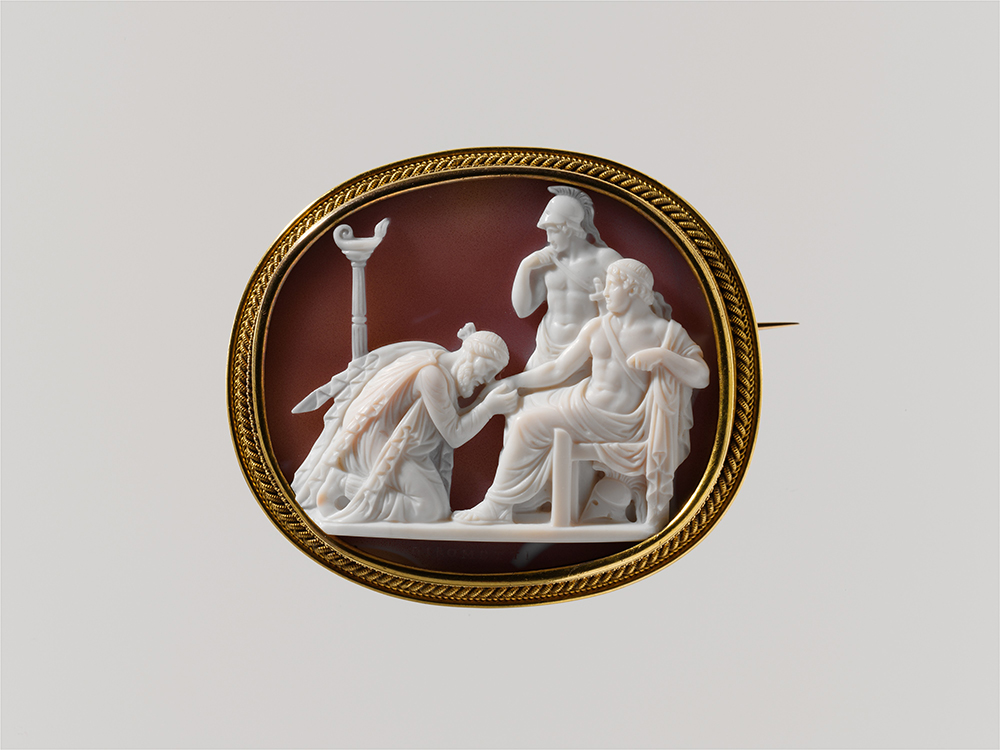
Up to this point, Achilles’ mercilessness hasn’t wavered. He’s spent the entire epic refusing to fight the Trojans, his honor slighted by the Greek chieftain Agamemnon. His wrath has nearly cost the Greeks the war. He has seethed and sulked, watching the Greek army grow embittered. It finally takes the death of his devoted companion, Patroclus, to rouse Achilles to fight. But avenging Patroclus, by slaying Prince Hector in retaliation, isn’t enough for Achilles. In an act of unthinkable cruelty, Achilles defiles Hector’s body by dragging it around the walls of Troy and Patroclus’ tomb. By the time Priam appears in Achilles’ camp, each protagonist has lost the thing most dear to him. Facing each other, both are burdened by inordinate suffering. It seems unthinkable that Achilles will relent to Priam’s request.
Caroline Alexander, in her translation of the Iliad, sketches the scene poignantly. Priam makes it into the Greek camp, escorted by Hermes in disguise, whom Zeus has sent down to aid the king. Hermes instructs Priam to take Achilles by the knees, in the traditional show of supplication, and pray that he can move Achilles. Priam is equal parts fearful and daring, kissing Achilles’ hands and grounding his appeal on the memory of Achilles’ father, Peleus. Peleus is an old man like Priam; Achilles’ father is off at home, without his son, his protector, just like Hector’s father. Yet Priam in his speech stresses a crucial difference:
Remember your father, godlike Achilles,
the same age as I, on the ruinous threshold of old age…
Yet surely when he hears you are living
he rejoices in his heart and hopes for all his days
to see his beloved son returning from Troy.
But I am fated utterly, since I sired the best sons
in broad Troy, but I say not one of them is left.
Priam goes on:
Revere the gods, Achilles, and have pity upon me,
remembering your father; for I am yet more pitiful,
and have endured such things as no other mortal man upon the earth,
drawing to my lips the hands of the man who killed my son.
Achilles finds himself overpowered by memory, without acknowledging any respect for the law of the gods. Nevertheless, he erupts into weeping and relents, handing over Hector’s body to Priam, who leaves the camp unharmed. A world divided between victors and vanquished is too convenient to imagine. This is neither the world of the Iliad nor ours. Rather, the beauty and power of Homer’s epic is that chiefs are transformed into suppliants. Brutal warriors remember they are sons to fathers faraway. The Bronze Age civilization in which the Iliad is set was deeply concerned with learning how to be a human. While the emotional intensity of this scene stirs audiences to believe the heart of their fiercest hero can indeed shiver and bleed, we must remember that, despite Achilles’ humbling show of mercy, the development of his own character and masculinity is effected only insofar as Zeus wills it. It’s just as likely that Achilles acts out of divine submission, which he acknowledges to Priam in a show of the fearsome rage we know him for:
So don’t anger me now. Don’t stir my raging heart still more,
Or under my own roof I may not spare your life, old man—
Suppliant that you are—may break the laws of Zeus!
In this fleeting exchange, we understand that pity may highlight or collapse the distance between characters who appear foreign and strange to one another, but it doesn’t operate alone or for the sole sake of illuminating a character’s humanity. Achilles and Priam discover their tribes aren’t so unlike that they cannot both respect those who have suffered—or stand to suffer—grave losses, but man’s shared vulnerability isn’t enough to permit enemies to hold off their fighting.
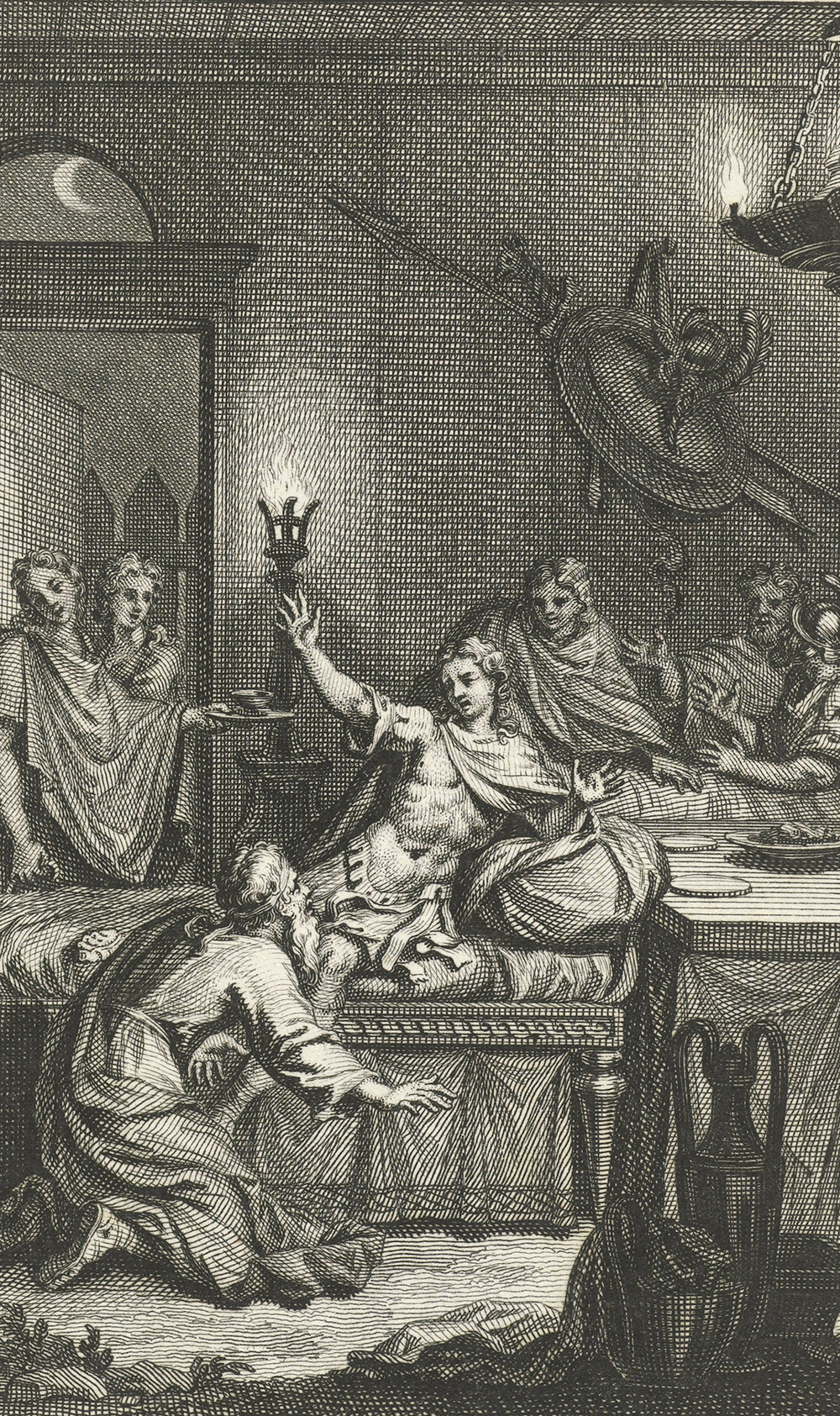
The gods intervene over and over, swaying humans to act as they wish. Throughout the course of the Iliad, men are buffeted and driven to madness and are even allowed to die with impunity. If, in the thinking of Bronze Age civilization, humans were either empowered or held back because of the will of the gods, we must consider the possibility that Achilles also wept and showed mercy toward Priam out of submission to Zeus’ law. Achilles, knowing from his mother’s prophecy that his fate has been sealed, can either return home without celebrity, or die fiercely in battle, his name remaining forever on the lips of posterity. The hero’s song therefore turns on the fact that his glory seems both lustrous and open to misfortune. It doesn’t matter, however, that Achilles cannot see that he’ll be immortalized for his humility to Priam. But submitting to the pain of others inadvertently transforms his reputation. He agrees to suspend the war for twelve days, for Priam to honor Hector’s death. His action, merciful as it may seem, might say more about the fear of what he cannot control. Could it be that his piety to the will of the universe is what we’ve been waiting for Achilles to show?
Perhaps no character in ancient literature personifies human suffering as unrelentingly as Odysseus. Daniel Mendelsohn notes that his name can literally be translated as “the man of pain.” “He is the one who travels; he is the one who suffers,” writes Mendelsohn in his memoir An Odyssey: A Father, a Son, and an Epic.
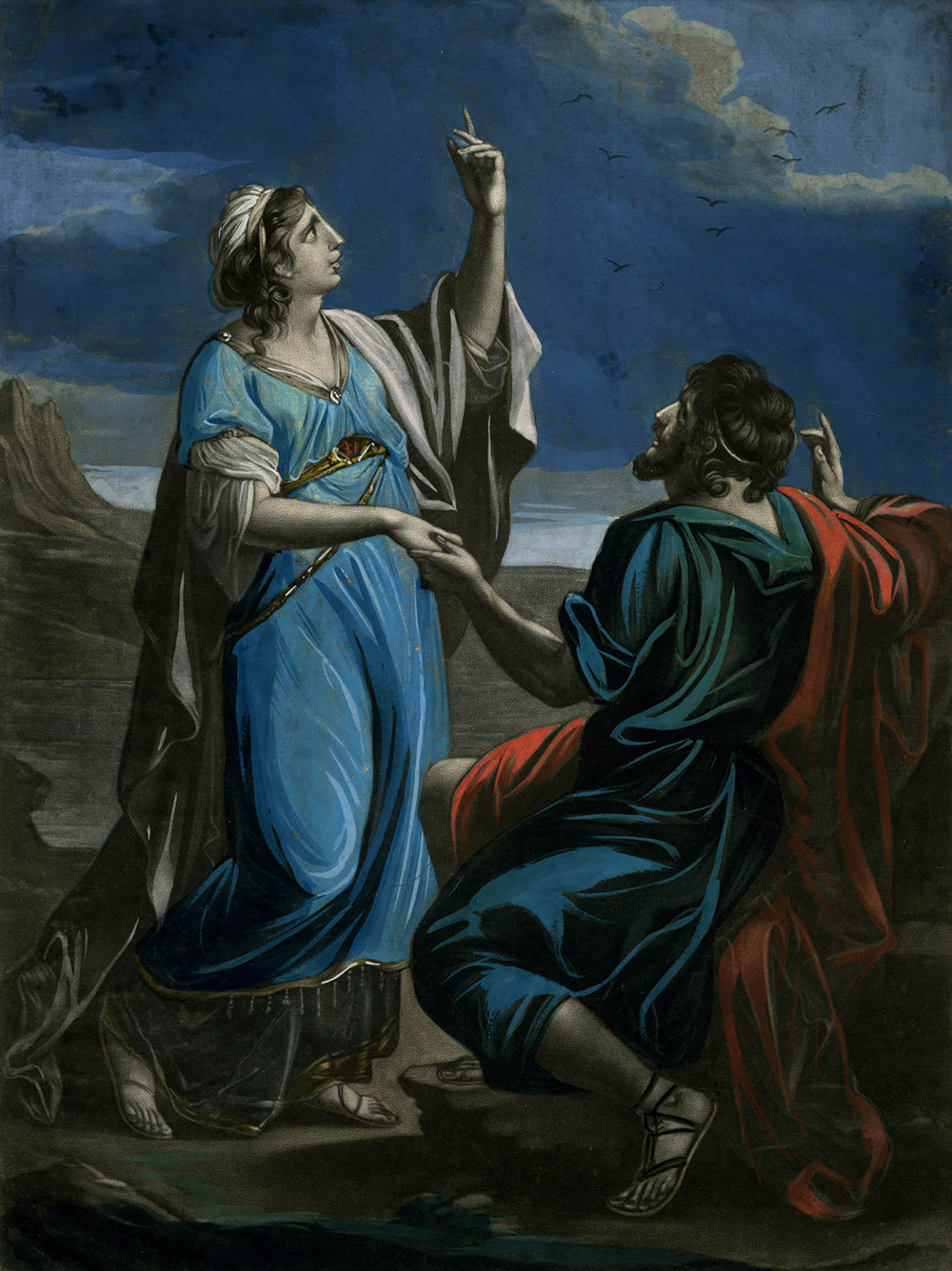
Pity, in the form of hospitality (xenia), offers Odysseus and his crew relief as they are tossed from shore to shore on their journey home from the Trojan War. When we first meet Odysseus, in Book 5, Homer shows him pining on Calpyso’s island as her prisoner. This first image of our hero opens with a dramatic climax: Odysseus exists solely at the behest of his protector’s magnanimity, as Emily Wilson shows in her recent translation of the Odyssey:
His eyes were always
tearful; he wept sweet life away, in longing
to go back home, since she no longer pleased him.
He had no choice. He spent his nights with her
inside her hollow cave, not wanting her
though she still wanted him.
Arriving on Calypso’s island, at the edges of the world, Hermes declares that he didn’t want to come here, but Zeus ordered it. But this isn’t the half of it. Calypso’s beneficence violates the will of Zeus. As Hermes continues:
None can sway or check the will of Zeus.
He says the most unhappy man alive
is living here…
Zeus orders you to send him on his way…
Calypso flies into a fearsome rage, however, as it seems beyond possibility she would forgive the slight to her honor. After all, it is she alone, of all the gods, who “cared for [Odysseus] / and loved him, and vowed to set him free / from time and death forever.” How cruel of the gods to punish a lesser goddess for protecting something dear to her. Left with no choice but to obey his order, Calypso surprises us with her ability to show pain. Is this the result, though, of losing something she cherishes or losing face before a higher authority?
The “lustrous” goddess, the epithet Homer gives her, softens in appearance toward her captive, Odysseus. Having relented to Hermes, dispensing Zeus’ command, she releases Odysseus, promising him provisions and a raft for safe passage, for “this is what / those sky gods want. They are more powerful / than me; they get their way.”
Calypso, whose name means “she who conceals,” complicates our understanding of those who hold the life of another in their hands. What bears noting, however, is the subtle way her pity is dispensed. Calypso tells Odysseus: “I am not made of iron: no, my heart / is kind and decent, and I pity [eleémon] you.” Wilson translates the last word of Calypso’s speech, eleémon, as a verb, although in Greek, it’s an adjective meaning “compassionate.” An earlier translation, by Robert Fagles, has Calypso say, “I am all compassion,” which gets closer at Calypso’s drive to bestow on herself an epithet, an attribute other than the one Homer gives her. The audience, relieved to see Odysseus freed, is nevertheless left with the question of the sincerity of Calypso’s emotion. To proclaim herself the embodiment of an emotion misconstrues telling for showing.
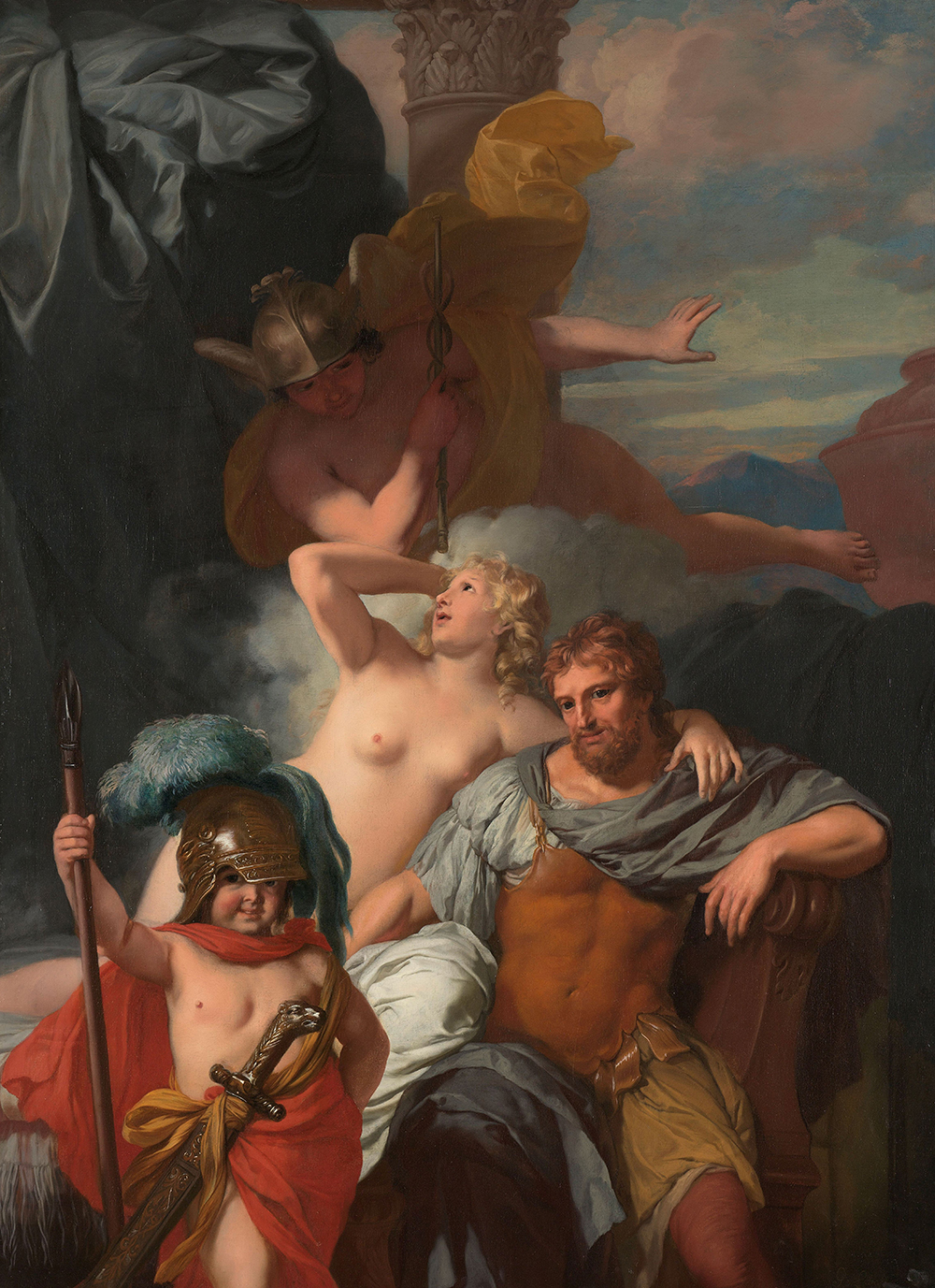
Pity perhaps exists to check the powerful—but what if we see Calypso in danger of losing her own freedoms? In the moment that she stands to lose her dear Odysseus, Calypso must reckon with the law of Zeus. He puts to her the demand to show mercy on her prisoner, and leaves it up to her to decide if she will act piously. In reframing the balance of power, readers understand how those in power operate within a hierarchy: their choices aren’t entirely their own. Through Calypso, readers are offered a model for how even lesser gods revere (an act bound up with fearing) those gods more omnipotent (although all these players are invisible). Such poignant losses suffered by the gods, who themselves can feel pain, offer something of a social mechanism to hold humans within their own bounds. Lending Calypso the duty to be humbled, by showing piety toward Zeus, offers an instructive moment for humans to consider how they themselves aren’t freed of the responsibility to show pity where it’s due.
If pity colored the emotional heart of the Iliad and Odyssey at strategic points, piety (pietās) hounds Aeneas in his quest to found a legendary race out of the ashes of Troy in the Aeneid. Published in 19 bc, Virgil’s epic refashions bits of myth and verses of Trojan prophecy to commemorate the era of peace Augustus has ushered in, following a century of bitter civil strife. Virgil models his piece of artistic propaganda on Homeric epic, handpicking characters from mythology, epic themes, and even historical figures to justify the authority of Roman imperium, at the precise moment Augustus is coming to power. Virgil’s poem must consider, however, the question of what kind of fate awaits his hero, the Trojan prince Aeneas, in his journey to settle a magnificent new city. And, more tellingly, what kind of hero will he be remembered as?
Aeneas’ epithet, pius, meaning “dutiful,” combined with his inheriting the sword of Achilles, leaves little doubt that he will succeed. By the time of the poem’s publication, Rome has become an empire without bounds.
In Book 2, Aeneas, recounting the fall of his beloved Troy, tells how the Greek warrior Sinon has been left behind by the Greeks, who he pretends have sailed away for home. Captured by the Trojans, Sinon pleads to King Priam, “Have pity on a soul that endures undeserved suffering.” In Latin, the verb used is miserēre (which preserves the word for “wretched,” miser). In the next line, Aeneas relates that, indeed, they feel a twinge for Sinon (miserēscimus)—the irony being that Priam, in sparing Sinon’s life, falls into Odysseus’ plan and unwittingly sets in motion the Greeks’ destruction of Troy.
Virgil recycles the Iliad’s pathos to fuel the emotion of his own story. Book 2 sees not only the fall of Troy, but also the tragic end of Priam. Homer relieved the noble king’s suffering centuries earlier, only for Virgil to snatch away his sense of security. As Troy burns, its warriors and families cut down in the middle of the night, Virgil telescopes into a dramatic scene inside the palace. Priam, “shaking with old age,” girds himself with armor instead of huddling with his wife and daughters at the royal altar for safety. The bodies of the Trojan royal family appear hunched over in prayer.
But Priam doesn’t kneel, rendering his fate all the more pitiful. The action immediately pivots to Achilles’ son, Pyrrhus, as he rushes toward Priam’s son, Polites. Pyrrhus slays Polites in a river of blood before Priam’s eyes. Priam—rather than beg for mercy, as he did with Peleus’ own father, Achilles—accuses his son’s assassin of committing a grave dishonor:
You’ve made me see my son’s death with my own eyes,
defiled a father’s sight with a son’s lifeblood.
You say you’re Achilles’ son? You lie! Achilles
never treated his enemy Priam so. No, he honored
a suppliant’s rights, he blushed to betray my trust,
he restored my Hector’s bloodless corpse for burial,
sent me safely home to the land I rule!
The force of Priam’s rebuke is felt by making the same rhetorical move he made in front of Achilles, at the end of the Iliad. But this time, evoking the memory of an enemy’s father falls flat. Pyrrhus shows all of Achilles’ pitilessness and none of the compunction that poured out of his father. Pyrrhus’ last words to Priam, before taking him by the hair and plunging a sword into the feeble king, are chilling: “Now die.”
We remember this scene, ten books later, as Virgil draws his epic to a close: Aeneas slays Turnus, leader of the Rutulian tribe, in a duel in Book 12. Aeneas’ capacity for pity is all but lost. We’re left to contemplate the future of the Roman empire through the light of Aeneas’ surprising turn toward mercilessness.
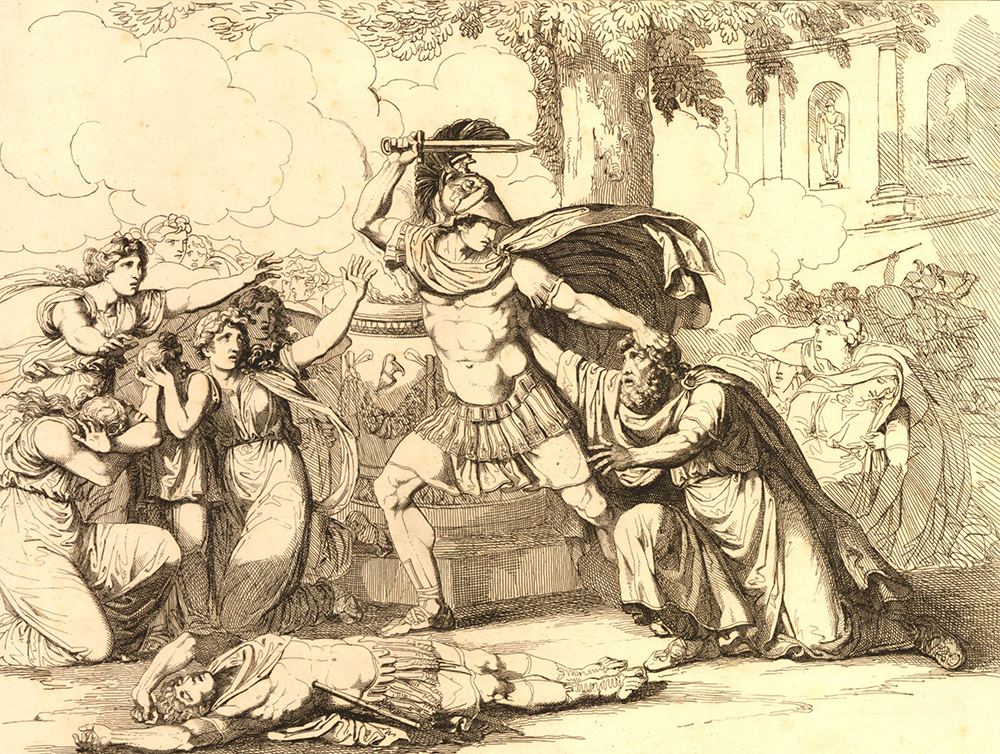
As the duel nears its climax, we see “Turnus stretching to full height, the hero / at speed, at peak strength. Yet he’s losing touch with himself.” Turnus struggles to hurl a boulder and feels himself falter. His strength dissipates as if on cue. His options grow thin. Thoughts run through his mind: “Where can he run? How can he strike out at the enemy? / Where’s his chariot?”
The moment Aeneas’ spear strikes Turnus, he calls out, “Indeed I deserve this—I don’t beg for escape.” Aeneas holds Turnus’ life in his hands. In his final act, Turnus conjures Priam’s earlier evocation of grief. His supplicating pose challenges Aeneas to still his hand and reflect on his next move—an act of deliberation we never saw from Pyrrhus. Here are Turnus’ last words:
If any concern for a wretched [miserī] father can still touch you—
your father Anchises was so dear to you, after all—
I plead that you pity [miserēre] the aged Daunus,
and send me back to my people, or, if you prefer,
return to them my body, stripped of light.
Blazing with wrath, Virgil’s hero murders Turnus, sending his soul to the underworld. Aeneas’ brutality colors our understanding of the mythic origins of an empire that, by the timing of Virgil’s writing, had already conquered most of the Mediterranean basin. The poem therefore enacts a political, even historiographical agenda: piety (respecting the powerful) carries more weight as a Roman virtue than pity (respecting the powerless). In the moment that Turnus’ soul sinks to the underworld, in the last line of the Aeneid, pity has already become a trace of its once noble shape.
For centuries, translators have leaned on the word pity to bind the experiences of classical heroes together with the ordinary lives of their readers, such that their instability offers us a window to glimpse our humanity most viscerally. Pity lets us imagine the other—a quality Aeneas ultimately loses sight of. Yet even the worst of us are capable of acts of grace. This is, after all, the resounding significance of the epic tradition.
And yet these stories are primarily concerned with how we remember those before us. If pity keeps us close to the shared humanity of these heroes from another time, from foreign civilizations, piety maintains our distance from the codes and virtues of the heroic ages. It’s easy to believe the ancients were our ancestors—in so many ways, our history preserves their traditions and values—and yet many of our differences are incommensurable. They revered the law of capricious, invisible gods, figures none of us today would recognize. Translators have used “pity” to make these characters less strange to us. Piety, however, has transformed these treasured characters into figures at times beyond our comprehension, thus decoupling the etymology.